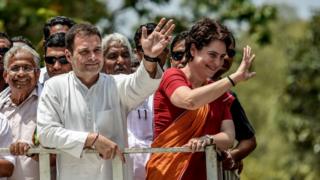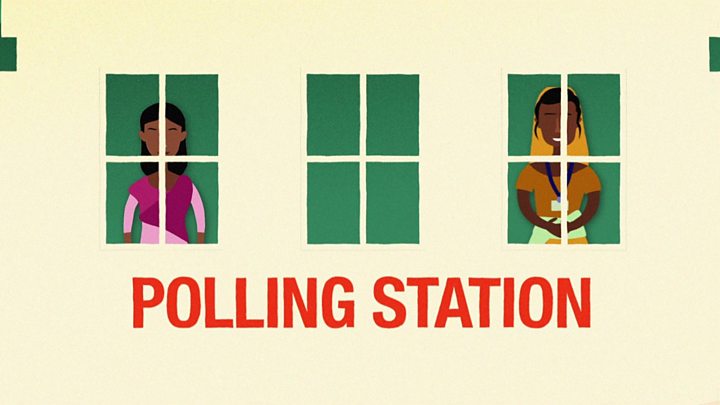 Image copyright
Getty Images
Image copyright
Getty Images
Tens of millions of people are preparing to cast their votes in the third phase of India's marathon seven stage election - but the reality is, all eyes will be on one man.
India's main opposition leader Rahul Gandhi is appearing on the ballot in Wayanad, Kerala, for the first time
But while a win here is important to the Congress party, it is not quite as crucial as it otherwise might be.
After all, Mr Gandhi is standing in another seat in a later stage.
Next month, he will be on the ballot in Amethi, his long-time constituency in the northern state of Uttar Pradesh. If he wins both, he will vacate one of the seats.
But why put yourself through two rounds of voting?
The Wayanad seat is one of 115 spread across 14 states and union territories up for grabs on Tuesday. It is the largest stage of the whole election, which is being seen as a referendum on Prime Minister Narendra Modi, who has been in power since 2014.
This particular seat is considered "safe" for Congress: the party has won the two elections held there since the seat's creation in 2009.
But Amethi - which goes to the polls on 6 May - is Mr Gandhi's family stronghold. He has been an MP for the region since 2004 and his mother, father and uncle have all won it during their careers.
So his decision to stand in Wayanad - a lush, hilly area in the Western Ghats - was met with surprise. Congress has said it is a "message to southern states that they are deeply valued and respected".
But opponents wondered aloud if this meant Mr Gandhi is unsure of winning Amethi. After all, his margin of victory in 2014 - a little over 100,000 votes - was seen as too close.
Here's everything else you need to know about Tuesday's vote.
Mr Modi's home state goes to polls
Tuesday's vote is also important for Mr Modi and his Hindu nationalist Bharatiya Janata Party (BJP), as his home state of Gujarat is voting.
Mr Modi may not be on the ballot, as he is running in Varanasi, but there is still a lot interest in various seats - including Gandhinagar, where party president Amit Shah is contesting.
Among those hoping to unseat him is Vejli Rathod, a Dalit (formerly untouchable) man who says he is still waiting for charges to be brought following his son's death in a police shooting back in 2012.
Fed up, he decided to run against Mr Shah, one of India's most powerful politicians.
"Victory may come and go, but I am fighting against Amit Shah for justice," Mr Rathod told BBC Gujarati.
Election-watchers are also likely to take an interest in Congress's 37-year-old Sherkhan Pathan, the state's only Muslim candidate.
Muslims account for around 9% of the state's population, but Gujarat has not elected a Muslim MP since 1984. Only three of the five Muslim candidates who contested state polls in December won.
However, Mr Pathan argues that it isn't his religion which won him his place on the ballot.
"I've been chosen to run because I'm young and represent a wide variety of voters here - not because I'm Muslim," Mr Pathan told BBC Gujarati.
It's Rahul Gandhi vs Raghul Gandhi in Wayanad
On a lighter note, there could be some confusion on the day as there are actually two Rahul Gandhis - and one Raghul Gandhi - all vying for votes in the same seat.
Rival parties are known to put up candidates with similar or same names to confuse voters, says BBC Hindi's Imran Qureshi, adding that this happens frequently in other constituencies as well.
India votes 2019
Raghul Gandhi, a 30-year-old local, told the BBC that he was not in the race because his name was uncannily similar to that of his rival.
"He is a national leader and I am a small state-level leader. I am a serious candidate," he said.
The BBC was unable to contact the Congress leader's other namesake. He faces 29 opponents in the ballot.
Will Sabarimala matter in Kerala's vote?
In September 2018, the Supreme Court overturned a historic ban on women entering a prominent Hindu shrine, Sabarimala - and this sparked huge protests across Kerala.
The BJP, which argued that the ruling was an attack on Hindu values, was accused of exploiting the issue to court its mostly-Hindu support base.
The party has been trying to make inroads in the state for some time now but it has never won a seat in Kerala. This time its contesting 14 of the 20 parliamentary seats. The rest have been left to regional allies.
What are the key issues in this election?
The economy and jobs are perhaps the two biggest issues.
The government has invested heavily in infrastructure, but it hasn't produced the desired economic boost - annual GDP growth has hovered at about 7%.
The farming sector has stagnated and a leaked government report suggests that the unemployment rate is the highest it has been since the 1970s.
In fact, Mr Modi's government has been accused of hiding uncomfortable jobs data.
Meanwhile, national security has been thrust to the fore following a deadly suicide attack by a Pakistan-based militant group in Indian-administered Kashmir in February.
Since then, the BJP has made national security a key plank in its campaign.
For some, this election is also a battle for India's identity and the state of its minorities, while for others it's about enhancing India's position in the world.
Mr Modi is a polarising figure, adored by many but also blamed for the country's divisions. Many accuse the BJP and its strident Hindu nationalism of encouraging violence against minorities, including the lynchings of Muslims suspected of smuggling cows.
